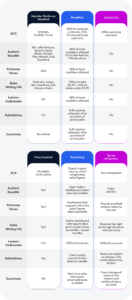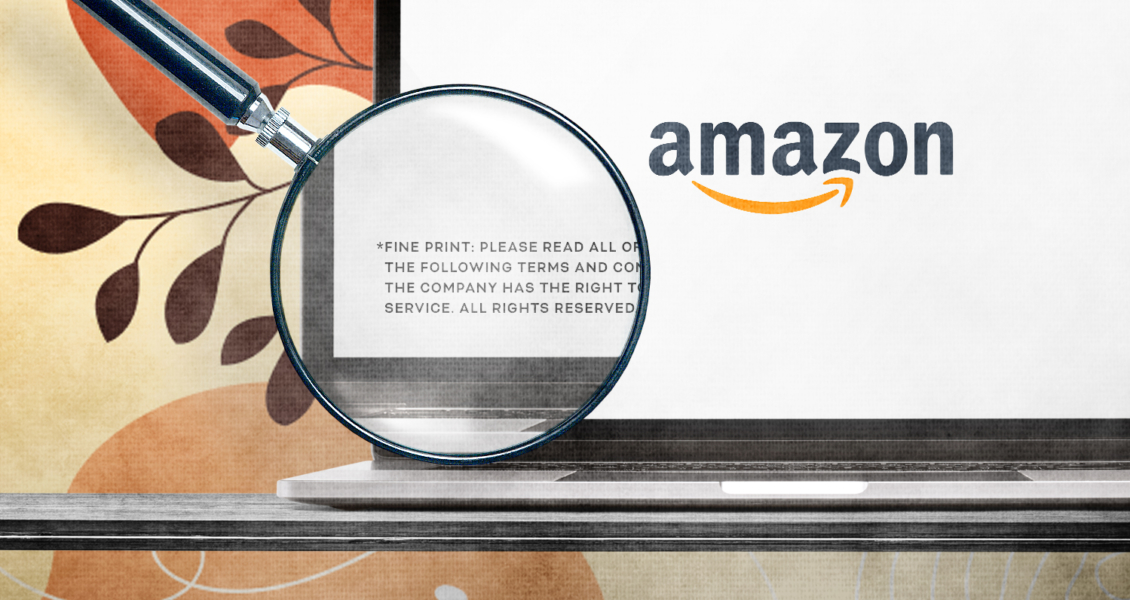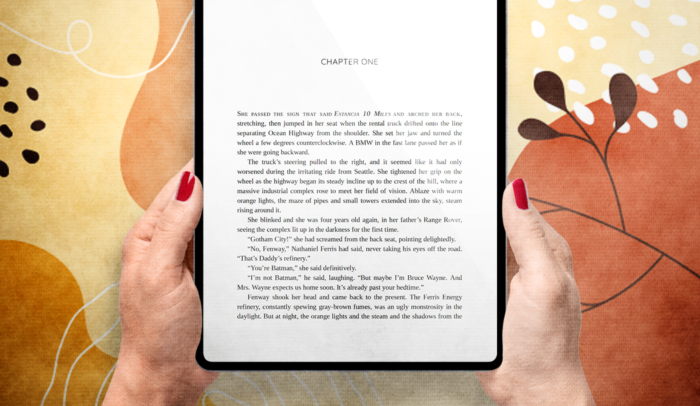Audiobooks are a great tool for reaching a wider audience.
But before people can listen to your book, they must be able to find it. That’s where audiobook distributors come in.
Distributors help Authors list their books on audiobook sales platforms like Audible, Amazon, Apple Books, and smaller platforms.
Many Authors confuse book marketing and distribution. Marketing is about getting people to want to read your book. Distribution makes it easier for audiences to find and buy your book on their preferred audiobook platform.
Audible has the lion’s share of the audiobook market, with 41 percent of audiobook sales within the U.S.
But Audible isn’t necessarily the best or only place you should sell your book. Below, I’ll explain who the leading audiobook distributors are, what makes them unique, and how you can choose the right distributor.
Here’s the broad overview:

Click here to download or share this comparison table.
Choosing the Right Distributor for You
Choosing the right audiobook distributor is an important decision because it determines who has access to your book and how much you will earn.
Before you make any decisions, ask yourself the following:
- Who are my target readers and what platforms do they use?
- Do I want to sell this book for promotional purposes through my website and social media? Would an exclusive contract conflict with those uses?
- Does the additional 15 percent royalties that ACX (Amazon’s distributor) pays for exclusive distribution of my book outweigh the potential earnings I might make via other platforms?
- How long would I be tied into an exclusive deal?
- What is most important to me in a distributor? Wide reach? Clear terms? Easy-to-read reports? Monthly payments?
Answering these questions will go a long way toward helping you figure out which distribution service is right for your book. But if you are looking for additional help with publication and distribution, Scribe Audiobooks offers a done-for-you service that will help clarify your needs.
ACX
ACX, or Audiobook Creation Exchange, is one of the most popular distribution platforms. ACX is owned by Audible, which is owned by Amazon.
If you’re familiar with publishing an eBook, you can think of ACX as the audiobook version of Kindle Direct Publishing (KDP).
Retailer Platforms Reached
Any books sold through ACX will be available on 3 major platforms: Audible, Amazon, and iTunes.
Royalties and Commissions
Authors who distribute through ACX have 2 main royalty options:
- Exclusive distribution: If you give ACX the exclusive right to distribute your audiobook, you cannot put the book on other platforms (e.g., Google Play, Scribd, or your personal website). ACX retains this right for 7 years, although they recently made it possible for certain Authors to change to a non-exclusive contract after the book has been on the market for 90 days. Authors who choose exclusivity keep 40 percent of their book sales.
- Non-exclusive distribution: With this option, you have the right to upload your book to other platforms. But you will earn a lower royalty rate of 25 percent.
There is also a “royalty-share” option for Authors who work with ACX to create their audiobooks. Authors have the option to pay an ACX producer half of the book’s earnings instead of paying an upfront audiobook production fee. The Author and producer each earn 20 percent royalties. A royalty-share agreement requires the book to be distributed exclusively through ACX for 7 years (with no option to shorten the contract).
Exclusivity
ACX does not require exclusivity, but Authors may opt for exclusivity in exchange for a higher royalty rate.
Price Control
Authors who distribute through ACX have no say in their book’s price. Each ACX retail partner determines the book’s list price.
On Audible, the price typically depends on the book’s length:
- under 1 hour: under $7
- 1 – 3 hours: $7 – $10
- 3 – 5 hours: $10 – $20
- 5 – 10 hours: $15 – $25
- 10 – 20 hours: $20 – $30
- over 20 hours: $25 – 35
These are general guidelines, but ACX retains sole discretion to change the price as they see fit.
Reporting
In theory, sales reporting for Audible should be clear. If ACX prices your book at $10, you sell 100 copies, and you’ve selected exclusive distribution, you will earn $400. If you’ve chosen non-exclusive distribution, you will earn $250.
In practice, ACX’s audiobook sales reporting is more complicated. Most Audible customers don’t buy audiobooks at the list price. They rely on Audible’s subscription service, which gives members one credit for $14.95 per month. Users can redeem the credit for any book in the store, and the Author gets paid based on the list price.
But there’s a catch. Audible has a liberal return policy, which allows listeners to exchange an audiobook no matter how much of it they’ve listened to. When someone returns a book, the Author loses out on those royalties.
In October 2020, a glitch in ACX’s reporting dashboards revealed how many times books had been returned. Some Authors learned that more than 50 percent of their sales were returned.
Many Authors were upset they were losing out on half of their sales, especially once it came to light that Audible’s customer service actively encouraged listeners to return books so they could access more than one book per month.
This move spawned the #audiblegate movement—a group of Authors, narrators, and rights holders who insist Audible should show transparent returns data and offer fair compensation for sales.
Terms of Service
ACX has faced many challenges to its terms, including #audiblegate and demands for a shortened exclusivity period. While ACX has made concessions, Authors should read the fine print and know what they’re agreeing to before signing up.

Unfortunately, reading the fine print can be difficult since Amazon’s terms are spread across multiple documents and are anything but transparent.
Author’s Republic
Author’s Republic is Scribe’s go-to distributor because it offers Authors fair compensation and wide distribution.
Retailer Platforms Reached
Author’s Republic has a huge network of more than fifty retailers, including giants like Amazon and Apple Books, and outlets popular in other countries, like Kobo and Storytel.
Author’s Republic is an especially good option for international Authors looking to break into the North American market. Unlike many other distribution services, there are no geographical restrictions.
Royalties and Commissions
Non-Scribe Authors receive 70 percent of royalties, paid monthly via PayPal.
If Scribe produces the audiobook, Author’s Republic will give the Author 85 percent royalties.
Be aware: this doesn’t mean you’ll receive 70/85 percent of the MSRP. Instead, you’ll receive 70 percent of your total royalties.
That means if your book sells through Amazon, you receive 70 or 85 percent of Amazon’s 25-percent royalties. The remaining money goes to Author’s Republic.
Other retailers offer different royalty percentages, so those figures will look different for each platform. For example, Nook pays a 45 percent royalty. That means a $10 book sale would earn a non-Scribe Author $3.15, while Author’s Republic would earn $1.35.
Exclusivity
Author’s Republic does not have exclusivity agreements with any particular outlets. You can sell your book on as many or as few as you would like.
You can also sell your book through personal channels, like your website or “shopping cart sites” like CDBaby.
That said, once you’ve signed up with Author’s Republic as your distributor, you can’t enter any other distribution agreements. (For example, you couldn’t sign up with them and with Findaway Voices.)
Price Control
Author’s Republic allows Authors to have complete control to set their book’s MSRP (Manufacturer’s Suggested Retail Price).
They acknowledge, “We can’t promise each platform will use it. Some partners control pricing based on the length of your audiobook.”
Nevertheless, Authors have more discretion over their earnings and price than they would by distributing solely with ACX.
Reporting
Author Republic’s dashboard is clear and easy to understand. You will be able to see your unit sales and royalty breakdowns, all in one place. That’s easier than logging into dozens of individual retail sites to check your sales.
Terms of Service
Author’s Republic has clear and fair terms of service.
Findaway Voices
Findaway Voices prides itself on letting Authors choose where they want to sell their books and at what price.
Retailer Platforms Reached
Findaway Voices currently has more than 40 retail and library partners, which means they offer much wider distribution than ACX.
Royalties and Commissions
Findaway Voices pays Authors 80 percent of the royalties they receive from retailers.
There are also adjusted royalty rates for library check-outs and subscription services.
Findaway Voices offers a marketplace to connect Authors with narrators, but unlike ACX, there is no royalty-share option. Authors must pay Findaway Voices narrators an upfront fee.
Exclusivity
Findaway Voices doesn’t have an exclusivity option for audiobooks.
Price Control
Authors have full control over pricing, including the ability to set up a higher Library List Price to compensate for the fact that library books have unlimited checkouts.
Authors can also work with Findaway Voices to set up sales promotions or pre-orders.
Reporting
Findaway Voices’ dashboard supports real-time sales figures so you can get up-to-date information about your earnings.
Still, some major retailers like Amazon don’t provide real-time updates, so your figures won’t be exact until official monthly totals come in. It also takes 2-3 weeks for new releases to have accurate sales data.
Terms of Service
Findaway Voices has transparent, clear terms, although they may be modified without notice to the user.
Kobo Writing Life
In 2019, the popular eBook site Kobo Writing Life (KWL) began publishing audiobooks. Kobo is part of Rakuten, a Japanese-based e-commerce company, giving it a strong international presence.
Retailer Platforms Reached
KWL distributes only to its network of publishing and library partners, including Walmart, Indigo, Bol, Overdrive, and Rakuten Kobo.
Royalties and Commissions
Kobo offers Authors 70 percent of the list price on books priced $2.99 and higher. For books between 99 cents and $2.98, Authors receive 45 percent royalties.
Exclusivity
KWL doesn’t ask for exclusivity, so you can easily pair other distribution methods with a Kobo account.
Price Control
KWL allows Authors to set their own prices, and they can do so in 16 different currencies. Kobo also has the unique option to let Authors offer their books for free.
Reporting
KWL features an author dashboard and report system, but reports aren’t broken down by retailer. Also, reports are only issued monthly.
Terms of Service
The terms are fairly straightforward, spelling out payments, obligations, and rights. But Kobo reserves the right to change the terms without notice.
Lantern Audiobooks (Formerly ListenUp)
Lantern Audio, formerly ListenUp, is one of the oldest audiobook players in the game. They offer both production and distribution services
Retailer Platforms Reached
In addition to its own online store, Lantern distributes to more than 20 outlets, including Downpour.com, Audiobooks.com, Storytel. They also distribute to libraries through Hoopla, Overdrive, and Mackin Educational Resources.
Royalties and Commissions
Authors receive 80 percent of the royalties, paid by check on a quarterly schedule. Payments aren’t processed until $50 has been earned.
Exclusivity
Lantern is a non-exclusive distributor and can be used alongside other distributors.
Price Control
Lantern allows Authors to set their own prices.
Reporting
Lantern’s reporting methods are difficult to nail down without having an account.
Terms of Service
Lantern’s agreement is unavailable through their website.
PublishDrive
PublishDrive is the only distributor on this list that offers eBook and print-on-demand options.
Retailer Platforms Reached
PublishDrive has direct agreements with certain outlets and a partnership with Findaway Voices for specific retailers. You can see the full list here.
Royalties and Commissions
Their business model is dramatically different from the others listed here. Instead of taking royalties, PublishDrive charges authors a monthly fee. For first-time Authors, the fee is $9.99 per month.
PublishDrive’s royalty structure is equally idiosyncratic. Authors receive full royalties, but the rate of those royalties depends on the individual outlet. These range anywhere from 25 percent to 70 percent. You can see the breakdown of each retailer’s percentage here.
Exclusivity
PublishDrive is non-exclusive.
Price Control
Authors have the right to set their own prices.
Reporting
PublishDrive offers clear royalty reports that can be broken down by retailer. They offer detailed descriptions of the payment schedule for each distribution channel as well.
Terms of Service
Terms are subject to change, with notification to the Author.
Soundwise
Soundwise’s audience is small but loyal. Many of its customers favor content within the Soundwise system, so distributing here can open your book up to new, dedicated listeners.
Retailer Platforms Reached
Soundwise doesn’t distribute to retailers, Instead, it distributes content through its own app and web interface.
Royalties and Commissions
Like PublishDrive, Soundwise doesn’t take a percentage of your royalties. Instead, they charge a monthly or annual fee, with different tiers of service.
As of writing, the “Essentials” plan costs $59 for lifetime access.
Authors do not pay transaction fees, but the payment company Stripe requires a small credit card fee that will be taken from your earnings.
Exclusivity
Soundwise is non-exclusive.
Price Control
Authors may set their own prices, and you can also set up limited-time promotions.
Reporting
As soon as a listener makes a purchase, the money becomes available in a Stripe account. You can move the money from Stripe to your bank account anytime.
Soundwise offers excellent analytics, and it also provides buyers’ email addresses so you can build your mailing list.
Terms of Service
Soundwise posts changes of terms to the website and notifies Authors by email.
Exclusive Distribution Through ACX vs. Wide Distribution
One of the biggest questions that self-published Authors face with their audiobook is, Should I go wide and reach as many platforms as possible, or should I stick with an exclusive contract with ACX?
We’ve found that most Scribe Authors benefit more from wide distribution, but that’s not necessarily the case for everyone. Below, I’ll break down the pros and cons of each option.
ACX Exclusivity Pros and Cons
Here are some of the pros of going the exclusive route:
- Audible dominates the audiobook market, raking in more than 40 percent of all audiobook sales.
- ACX offers a royalty share option, which may be beneficial to Authors who don’t have the upfront funds for audio production.
- The 40 percent royalty rate for ACX-exclusive Authors is higher than the 25 percent you’d get distributing your book through a non-exclusive contract.
- ACX has recently changed the terms of their exclusivity agreements, making it possible for some Authors to reduce the length of their exclusive contract to 90 days.
Here are some of the cons of signing an exclusive deal with ACX:
- The 7-year exclusivity period limits your ability to distribute your book widely, and not all Authors will be able to get out of that clause. Be sure you know whether the full term will apply to your book.
- ACX determines the price of your book, so you’ll have little control over how much profit each copy of your book will earn.
- #Audiblegate highlighted the shortcomings of Amazon’s reporting and revealed that Authors aren’t making as much money as they arguably should.
- Just because ACX is the largest player in the audiobook market, doesn’t mean they’re the best option for your book. If your target audience buys more books on other platforms, you might miss out on key sales.
Wide Distribution Pros and Cons
With wide distribution, there are some clear pros:
- You will be able to reach more platforms, which means reaching more potential readers.
- Your book will have more visibility, particularly in other countries.
- You’ll have the ability to set your own prices, which also gives you more control over your total earnings.
- You’ll have access to promotional platforms like Chirp, an audiobook service that offers discounted books to members.
- You will retain the freedom to sell your audiobook through your website or social media platforms.
- Your book can be rented in libraries and through other, non-Amazon subscription services.
- Most services offer a dashboard that allows you to see all your sales at once, rather than navigating many different retail sites.
Still, some cons exist:
- Even though your book can still be listed on Amazon, Audible, and iTunes, you will only earn 25 percent royalties on those platforms.
- If all your readers come through ACX outlets, you could be losing money by not going the exclusive route.
- You may need to give up a portion of your royalties or pay a monthly fee to access the most wide-reaching distributors.
Most Authors benefit from the freedom of wide distribution. But before you decide, consider who your target listeners are and how you think most of them will want to access your book.
Calculating Your Royalties from Distributors
One of the best ways to make an informed decision is to consider your projected royalties for each distribution platform.
Calculating royalties from à la carte sales is the easiest method of determining your potential earnings.
Simply take your retail list price and multiply it by your royalty percentage. That’s your per-copy royalty amount. So, if you sell a book on Nook for $10 at a rate of 45 percent royalties, that means you’ll earn $4.50 per book.
Remember, you also have to calculate how much your distribution platform takes. If you’re a Scribe Author working through Author’s Republic, 85 percent of $4.50 will net you more total earnings than distributing the same book through Findaway Voices at a rate of 80 percent.
When you’re calculating your à la carte sales through Amazon, keep in mind that they will likely set the price based on the book’s length. If you’re confident that you can sell your audiobook for $20, but Amazon only charges $10, your projected royalties might be less than you hoped for.
À la carte sales are a good starting place for making a decision, but you should also consider the financial impact of subscription services and library checkouts. Many Authors earn more royalties from these alternative sources than from direct sales.
Below are the typical royalty structures of these alternative channels.
Royalties from Subscriptions
Audiobook subscription services like Audible, Scribd, Downpour have become popular among avid listeners because they offer discounted books and added member benefits.
There are 3 different royalty modes when it comes to audiobook subscription services:
1. Credit-based subscriptions
With services like Audible and Downpour, members purchase 1 credit per month, which they can redeem for any book they like.
Authors get paid royalties based on the list price of their book, not the credit cost. So, if a listener spends $15 on an Audible credit but redeems it for a $10 book, the Author’s royalties will be 25 or 40 percent of $10 (depending on their exclusivity agreement).
2. Unlimited subscriptions—Combined portion
With services like Kindle Unlimited audiobooks and Scribd, users pay a monthly fee to access all the books they want. The royalty rates tend to be less for Authors, but your book may attract a different set of listeners.

With this model, your book is divided into fifths, based on its runtime, and you’re paid a percentage of the list price every time a pool of listeners reaches 5-fifths of your book.
3. Unlimited subscriptions—Revenue pool share
With this model, when customers pay for the unlimited service, a portion of their money is grouped into a pool. The more subscribers, the larger the pool of money. Each Author then receives a portion of that pool based on how much people listen to it. Here, there’s no connection to the list price of the book. Your royalties are driven entirely by how many total subscribers there are and how many of them select your book.
Royalties from Library Checkouts
Libraries have seen a boom in audiobook loans thanks to apps like Overdrive, Libby, and Hoopla. Authors who opt for non-exclusive distribution can earn more money by making their book available to libraries.
There are 2 main royalty modes libraries use:
1. Library Price
When a library buys a copy of a book, they have the right to lend it an unlimited number of times as long as only one patron at a time has access to that copy. Audiobooks work the same way.
Let’s say that a library buys 2 copies of your book. If you sell it for $10, you’re only making $20 total, no matter how many people check it out.
As an Author, setting a higher library list price is a good way to maximize your profits. If you charge 2-3 times more for a library copy than for a regular retail copy, you can generate higher royalties.
Let’s say that you’ve signed up with Author’s Republic at an 85 percent royalty rate, and they’ve distributed your book to Overdrive, which gives 45 percent royalties. If the library list price of your book is $20, you will make $7.65 from each library sale. If you left the MSRP and the library price the same ($10), you would only earn half that.
2. Cost per checkout
Instead of buying the license to loan the book upfront, libraries receive your book at no initial cost. Each time a patron checks it out, you’ll earn a small amount of money. This option is great for independent Authors who might have a harder time convincing librarians to pay for the book outright.


